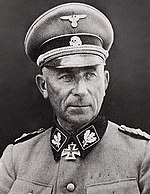About Paul Hausser
- Paul Hausser (7 October 1880 – 21 December 1972) was a German general and then a high-ranking commander in the Waffen-SS who played a key role in the post-war efforts by former members of the Waffen-SS to achieve historical and legal rehabilitation. Hausser served as an officer in the Prussian Army during World War I and attained the rank of general in the inter-war Reichsheer.
- After retirement, he joined the SS and was instrumental in forming the Waffen-SS.
- During World War II, he rose to the level of army group commander.
- He led Waffen-SS troops in the Third Battle of Kharkov, the Battle of Kursk and the Normandy Campaign.
- Hausser was the highest-ranking officer in the Waffen-SS alongside Sepp Dietrich.
- Unlike Dietrich, Hausser was a trained staff officer before joining the SS. After the war he became a founding member and the first spokesperson of HIAG, a lobby group and a revisionist veterans' organisation, founded by former high-ranking Waffen-SS personnel in West Germany in 1951.
- It campaigned for the restoration of legal and economic rights of the Waffen-SS employing a multi-prong propaganda campaign to achieve its aims. Hausser wrote two books, published by right-wing imprints, arguing the purely military role of the Waffen-SS and advancing the notion that its troops were "soldiers like any other", according to the title of the second book.
- Under Hausser's leadership, HIAG reshaped the image of the Waffen-SS as a so-called pan-European force that fought honorably and had no part in war crimes or Nazi atrocities.
- These ideas have since been discredited by historians.
Read more at Wikipedia
See Also
- Famous People's Birthdays on 07 October, Germany
- Famous People's Birthdays in October, Germany
- Famous military personnel's Birthdays on 07 October, Germany
- Famous military personnel's Birthdays in October, Germany
- Famous military officer's Birthdays on 07 October, Germany
- Famous military officer's Birthdays in October, Germany


 Date of Birth:
Date of Birth:  Place of Birth: Brandenburg an der Havel, Brandenburg, Germany
Place of Birth: Brandenburg an der Havel, Brandenburg, Germany